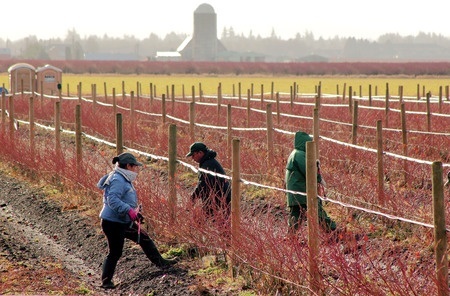Migrant Farmworkers Transported in Dangerous Vehicles, Investigation Finds
Wednesday, December 28, 2016 | 0
An Associated Press investigation of migrant farmworker transportation found that at least 38 farmworkers have died in vehicle crashes since January 2015.
 The crashes have occurred while workers were headed to and from the fields on daily-shift days, while they shuttled between farms during the season, and while they were being driven home to their families at the end of the season.
The crashes have occurred while workers were headed to and from the fields on daily-shift days, while they shuttled between farms during the season, and while they were being driven home to their families at the end of the season.
The Associated Press found that the vehicles farmworkers ride in are frequently overloaded, poorly maintained and uninsured.
The Migrant and Seasonal Agricultural Worker Protection Act of 1983 (MSPA) requires employers to provide safe transportation for farmworkers, but the Department of Labor team tasked with enforcing that law "lacks the resources to be everywhere workers are being transported," officials told the Associated Press.
The AP's investigation brought to light the story of Jose Chavez, a 22-year-old farmworker who was killed when the bus transporting him and 18 others back to Mexico at the end of the 2015 growing season sideswiped a barrier. Chavez was among six workers killed in the crash.
Chavez had worked for Vasquez Citrus & Hauling of Lake Placid, Florida. He obtained a federal H-2A guest worker visa in order to work for the company for $11.56 an hour. He was guaranteed room, board and free transportation to and from Mexico.
The AP reports that Vasquez Citrus' workers' compensation policy did not cover the journey home.
Courts in California and Pennsylvania have invoked exceptions to the "going and coming" rule in cases involving farmworkers. The "going and coming" rule generally holds that an employer is not liable for injuries that occur during a worker's commute.
In the California case, Hinojosa v. WCAB (1972), Miguel Hinojosa was a farmworker who was paid hourly, including for the time spent in transit between the various ranches on which he worked. He had to secure his own transportation, which he arranged with his coworker.
On June 8, 1970, Hinojosa was seriously injured when his coworker's car was involved in a crash on their way home from the fields. His employer argued that the "going and coming" rule barred his workers' compensation claim because the accident occurred during Hinojosa's commute.
The California Supreme Court disagreed, saying that "the job is structured, and dependent upon, transportation from one place of work to another so that the use of an instrument of such transportation is a requisite of employment."
Because the car was an essential requirement of the job and required to perform the job, the injury suffered in the car was covered by workers' compensation.
In Lie v. Chan Dara (2002), the U.S. District Court for the Eastern District of Pennsylvania determined that an exception to the going and coming rule applied because transportation to and from work was a part of the laborers' employment agreement.







Comments